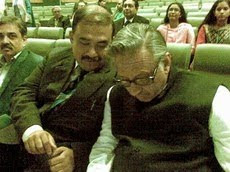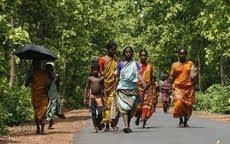The results of the 2009 parliament elections might be the beginning of the end for two of the most divisive trends of contemporary Indian politics - Mandal and Mandir. The poor performance of the Mandalite parties who pursued lower-caste politics and the revival of the Congress in Uttar Pradesh signifies the beginning of a new trend -
 the Dalits have seen through their self-seeking and totally irresponsible leaders. The future is tough for the likes of Mayawati and Mulayam, Laloo Prasad and Ram Vilas Paswan. The Congress - specially its young general secretary Rahul Gandhi - has now tasted blood and will pursue the path of Congress revival in the Hindi belt with single minded determination, keeping the mandalites out.
the Dalits have seen through their self-seeking and totally irresponsible leaders. The future is tough for the likes of Mayawati and Mulayam, Laloo Prasad and Ram Vilas Paswan. The Congress - specially its young general secretary Rahul Gandhi - has now tasted blood and will pursue the path of Congress revival in the Hindi belt with single minded determination, keeping the mandalites out.The poor perfornance of the BJP, which I had predicted in a previous column three months, also indicates the Indian people, even in the Hindi belt, are sick of the Ram mandir issue. Ram is our mythical hero and some kind of a role model and all Indians have a soft corner for him. But Indians have, in this election, shown they dont expect any conflict over the Ram Mandir, they dont want the glory of Ram to be established over the blood of thousands of our Muslim brothers. Ram is a symbol of justice and not oppression and if Ram lived now, he would have been as fair to our Muslim brothers as to the Hindus who worship him. The BJP cannot afford to behave like Aurangzeb while swearing by Ram. Varun Gandhi's theatrics made some local impact, but in this election, his cousin Rahul has come out as a taller national leader.
 Indians are a mature electorate - so cheap stunts that divide people on the basis of caste and religion is being increasingly rejected by them. After two decades of Mandal and Mandir, two political platforms that divided our people rather than united them, Indians are tired to cheap political traders. As a growing national economy and a sense of shared destiny unites India more than ever before, as millions of Indians of all clases and caste and races and religions look forward to a day when India will take centre stage in world politics, they are rising to reject the politics of division and exclusion. They have voted heavily for the Congress because they see India's oldest and largest political party as the only one capable of taking India where Indians want the country to be in this century. I had all faith in a Congress revival, I had no doubts the UPA would form the next Indian government and that stability will prevail - which is why I retained my shares and mutual funds in the stock market and did not sell them, as many did anticipating a crash if the elections led to a hung parliament. Now that the Congress is going to form the government on its own terms, I am sure Manmohan Singh will push ahead with critical reforms that the Left had blocked - and for those Indians who invest in share markets like me, good days are back again, despite the global recession (manda) continuing.
Indians are a mature electorate - so cheap stunts that divide people on the basis of caste and religion is being increasingly rejected by them. After two decades of Mandal and Mandir, two political platforms that divided our people rather than united them, Indians are tired to cheap political traders. As a growing national economy and a sense of shared destiny unites India more than ever before, as millions of Indians of all clases and caste and races and religions look forward to a day when India will take centre stage in world politics, they are rising to reject the politics of division and exclusion. They have voted heavily for the Congress because they see India's oldest and largest political party as the only one capable of taking India where Indians want the country to be in this century. I had all faith in a Congress revival, I had no doubts the UPA would form the next Indian government and that stability will prevail - which is why I retained my shares and mutual funds in the stock market and did not sell them, as many did anticipating a crash if the elections led to a hung parliament. Now that the Congress is going to form the government on its own terms, I am sure Manmohan Singh will push ahead with critical reforms that the Left had blocked - and for those Indians who invest in share markets like me, good days are back again, despite the global recession (manda) continuing. The demise of the Left in Indian politics, because of its very poor showing in its strongholds like West Bengal and Kerala, is the other big outcome of 2009 elections. Strangely, the Congress has done so well in rural India because of the programmes it pursued under the pressure of the Left - rural poverty alleviation schemes, the farmer loan waivers, the rural income guarentee schemes and all that. Manmohan and Chidambarams and such other votaries of liberalisation also knew that they had to win elections. So they took care to address the concerns of India that does not shine - unlike the BJP in 2004. That is what makes the Congress unique - it is here and it is also there, it is pushing for globalisation and liberalisation but it is also pushing for schemes like NREGA and farm loan waivers and all that.
The demise of the Left in Indian politics, because of its very poor showing in its strongholds like West Bengal and Kerala, is the other big outcome of 2009 elections. Strangely, the Congress has done so well in rural India because of the programmes it pursued under the pressure of the Left - rural poverty alleviation schemes, the farmer loan waivers, the rural income guarentee schemes and all that. Manmohan and Chidambarams and such other votaries of liberalisation also knew that they had to win elections. So they took care to address the concerns of India that does not shine - unlike the BJP in 2004. That is what makes the Congress unique - it is here and it is also there, it is pushing for globalisation and liberalisation but it is also pushing for schemes like NREGA and farm loan waivers and all that. This is the Indian reality, the Indian faith that truth does not lie in one extreme or the other but resides in between. The classic Sri Krishna response before the battle of Kurukshetra - sending his army to the Kauravas but himself riding the chariot of Arjun. That is why India under the Congress pursued a non aligned foreign policy in the early years of the Republic. 2009 elections indicate that India is for middle path centrist politics, a politics of balancing concerns rather than an extreme plunge towards a single direction. So extreme politics don't work in India and unless the BJP leaders develop a better sense of Indian history and philosophy, the party will meet the fate of its previous incarnation, the Bharatiya Jan Sangh.
This is the Indian reality, the Indian faith that truth does not lie in one extreme or the other but resides in between. The classic Sri Krishna response before the battle of Kurukshetra - sending his army to the Kauravas but himself riding the chariot of Arjun. That is why India under the Congress pursued a non aligned foreign policy in the early years of the Republic. 2009 elections indicate that India is for middle path centrist politics, a politics of balancing concerns rather than an extreme plunge towards a single direction. So extreme politics don't work in India and unless the BJP leaders develop a better sense of Indian history and philosophy, the party will meet the fate of its previous incarnation, the Bharatiya Jan Sangh.The Left lost in Bengal because in its rush for rapid industrialisation, it began to look pro-capital and it ended up upsetting the rural poor and the minorities, the lower castes and the Muslims who have formed its core support base. But Mamata Banerji's success is also the success of a new vareity of regionalism that will gain ground in India in years to come. It is a regionalism of a national variety, a politics of highlighting regional concerns without being parochial and obscurantist like Maharastra's Shiv Sena. Mamata has now humbled both the Conngress and the Left - she forced the Congress to an alliance on her own terms (Trinamul will contest double the number of seat than the Congress) and then she forged ahead of the Left on her own ( winning 19 seats alone against the Left's combined tally of 15).
 Mamata is the regionalist of the Congress variety , not the DMK-AIDMK or Shiv Sena variety. Her fight is against Left hegemony in West Bengal and she was upset with the Congress high command because she did not get support from them to launch an all out assault against the Left. That is why Trinamul Congress was formed. But ideologically she was always closer to the Congress than to the BJP - she went to the BJP to pursue her one-point program of bringing down the Left. Now that the Congress also wants to demolish the Left after the nuclear deal episode, Mamata does not have a problem. Mamata is also different from Mayawati. She wants to be the chief minister of West Bengal - that's her main ambition. She does not want to become a major union minister, surely not the Prime Minister. She has already said she will accept any ministry given to her party but she wants early elections in West Bengal, much before the scheduled date of 2011, and she wants it under a neutral dispensation (under President's rule).
Mamata is the regionalist of the Congress variety , not the DMK-AIDMK or Shiv Sena variety. Her fight is against Left hegemony in West Bengal and she was upset with the Congress high command because she did not get support from them to launch an all out assault against the Left. That is why Trinamul Congress was formed. But ideologically she was always closer to the Congress than to the BJP - she went to the BJP to pursue her one-point program of bringing down the Left. Now that the Congress also wants to demolish the Left after the nuclear deal episode, Mamata does not have a problem. Mamata is also different from Mayawati. She wants to be the chief minister of West Bengal - that's her main ambition. She does not want to become a major union minister, surely not the Prime Minister. She has already said she will accept any ministry given to her party but she wants early elections in West Bengal, much before the scheduled date of 2011, and she wants it under a neutral dispensation (under President's rule).Back in Assam, the Congress has more or less held its own, despite huge undercutting by the UDF. Chief Minister Tarun Gogoi finally recognises the UDF factor . But Rahul Gandhi's go it alone policy in UP and Bihar should be maintained in Assam. Gogoi has won the trust of the Assamese by not aligning with the UDF and so could manage to check the advance of the BJP-AGP alliance. Now he should make a strong effort, with backing of the High Command, to regain the Congress support base in minority areas by protecting the minorities. The Congress will be marginalised, as I have said before, in the minority areas if it goes for a short cut - an alliance with UDF. It must strongly revitalise the party in the minority areas, using its new-found strength at the national level. The High Command should not push Gogoi for an alliance with the UDF - but it should push him to win over the UDF leadership back to the Congress fold.
( Subir Bhaumik is the BBC's East India Correspondent )







